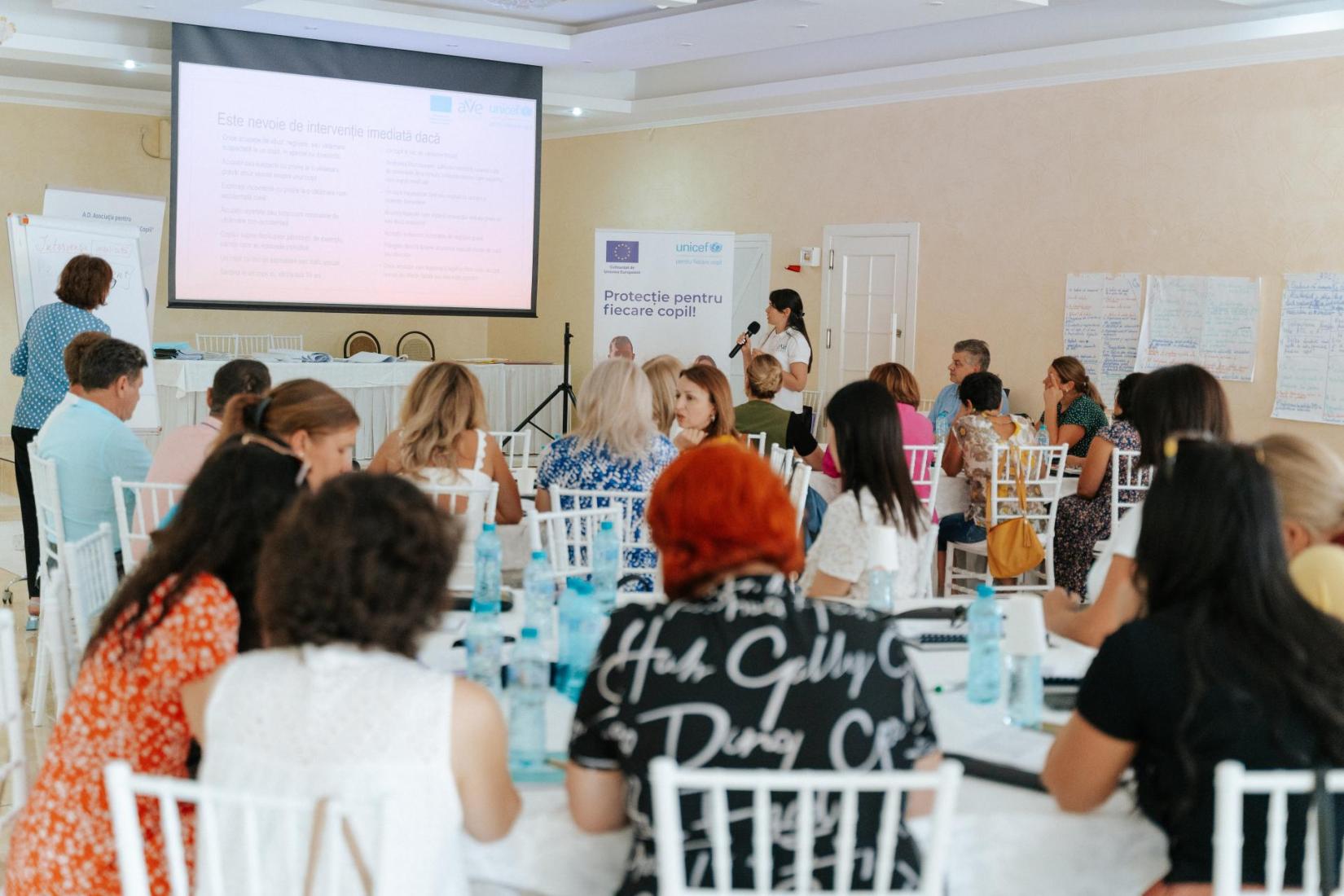UNICEF continues to strengthen the frontline workers' capacities to ensure the safety of children
04 October 2023
- With the support of the EU Humanitarian Aid, UNICEF trained 40 specialists across all regions in Moldova to boost the skills of frontline workers in safeguarding children, including refugees.

With the onset of the war in Ukraine, frontline workers in Moldova, such as child protection specialists, had to reinvent their working methods to ensure the protection of refugee children. Aurica Cebotari, the head of the Directorate of Social Assistance and Family Protection in Stefan Voda, recalls the early days of the refugee crisis. "We were the first region that started to host refugees. So, we identified many unaccompanied and separated children, being forced to change the approach in our activity," says Aurica Cebotari while participating in a learning program for trainers. "We were unprepared to work with refugee children. Thus, we needed a lot of training sessions and support to cope with the emergency."
UNICEF continues to support the Ministry of Labor and Social Protection and local authorities to strengthen the capacities of frontline workers, ensuring they provide quality services to children and adolescents in difficult situations. In this context, UNICEF, in partnership with the Association for Child and Family Empowerment ‘AVE Copii’ and with the support of European Union Humanitarian Aid, developed and organized a training program for 40 trainers in child protection field for each region of the country.
These trainers will conduct sessions and establish working groups involving staff from the Directorates of Social Assistance and Family Protection, and members of multidisciplinary teams. “Now is the time for us, the specialists, to be trained on how to proceed and provide quality support to refugee children because the war is not over,” says Aurica Cebotari. “Many children continue to flee the war and are unaccompanied or separated, and they remain in our localities. In this case, multidisciplinary teams need to know how to work efficiently. After this training, I will train the directorate’s staff and organize training sessions with multidisciplinary teams, starting with localities with more refugees.”
Livia Tolinca, a child protection specialist from the Râșcani district and a training participant, believes that safeguarding children in vulnerable situations also depends on effective collaboration among multidisciplinary team members responsible for preventing and combating violence and abuse in families. Livia’s foremost goal is to enhance their ability to intervene promptly when a child needs specialized support.
“These trainings are effective for providing information to community actors, such as the mayor, police, social and medical workers,” says Livia. “Following this training, I will organize sessions in the field with multidisciplinary teams. I hope there will be a positive impact because we face some difficulties regarding intersectoral collaboration. Members of multidisciplinary teams gain a better understanding of each other’s roles and are more accountable when are involved in various informational activities.”
In the training program, child protection and social assistance specialists learned more about child protection regulations, case management during emergencies, and how to support children at risk.
“The number of Child Protection cases in Moldova is higher following the refugee crisis. This represents a need and an opportunity to train specialists in the field. Our goal is to have a dedicated trainer in each district who can be more accessible and devise specific activities, providing methodological support tailored to the region’s realities,” says Antonina Comerzan, project coordinator and trainer within the Association for Child and Family Empowerment ‘AVE Copii’. “Their willingness to return to the region and organize training sessions with community actors gives us hope that they will improve the quality of case management provided to children in need. The objective is to reduce the number of cases, ensure that emergencies are managed by competent people.”
With support from EU Humanitarian Aid, UNICEF and its partners have worked alongside the authorities to identify and ensure the protection of unaccompanied and separated children (UASC) and other children at risk. As a result, UNICEF and its partners identified 126 unaccompanied and 827 separated children from Ukraine. These children received protection, assistance, and referral services, including temporary accommodation, placement in foster families, and other specialized services.
To strengthen the capacities of the frontline workers, since the outbreak of the war, UNICEF has organized and conducted various training sessions on child protection, prevention, and combatting gender-based violence, thanks to the generous support of European Union Humanitarian Aid. Between May 2022 and August 2023, 751 frontline workers and staff were trained. Within this group, 78 social workers and child protection specialists from the territorial guardianship authorities have been trained in child protection case management, including procedures for registering unaccompanied and separated children for temporary protection. Additionally, 159 social workers from the General Department for Child Rights Protection of Chisinau have received a similar training package. According to the latest official data, more than 118,000 people from Ukraine have found safety in Moldova; half of them are children.




